There is a sincere dichotomy in play here, and I want to make sure I express this accurately. Triangle PHP is a gift. Having the opportunity to work through complex mental health concerns and trauma in a space that is specifically designed with my LGBTQ+ community in min ...
About HRI Hospital
HRI Hospital in Brookline, Massachusetts, offers mental health and addiction programs. There are women’s only programs, young adult treatment, LGBTQ programming and general adult programs. Whether you need inpatient, partial hospitalization or outpatient treatment, HRI Hospital has a mental health or addiction program to meet your needs.
Many health insurance plans are accepted, including state and federal Medicaid. There are financial assistance programs available for those who cannot afford treatment.
Inpatient Mental Health Treatment
There are three inpatient mental health programs available. These include a women’s inpatient program, dual diagnosis treatment and a general psychiatric unit.
The women’s mental health unit helps women deal with the things that affect their mental health. Stress, disruptive or self-destructive behaviors, eating disorders, domestic violence, substance abuse and past trauma are all dealt with in this program that is designed just for female patients.
The co-occurring addiction and psychiatric treatment program helps individuals find some stability in mood and health. Participants receive support and intensive care 24/7. Treatment may start with detoxification and medication assisted treatment. Cognitive behavioral therapy and group therapy will help you recognize your negative habits and harmful thought processes and help you develop a more positive and healthier lifestyle.
The general psych unit is there to offer support and treatment to individuals who may be struggling with various disorders. Diagnosis may include mood or personality disorders, schizoaffective or dissociative disorders, depression or anxiety.
Partial Hospitalization and Intensive Outpatient Treatment
There are partial hospitalization programs geared to young adults, women and LGBTQ adults, dual diagnosis programs and a general treatment program for adults. Some of these programs are offered virtually which allows individuals to attend treatment from the safety and comfort of their own homes.
The partial hospitalization programs run Monday to Friday from 10am until approximately 3pm. These programs can deal with emotional or mental health issues and co-occurring addiction issues. Five groups are offered each day with individual therapy once a week and an appointment with psychiatry twice a week.
Comprehensive Treatment Plans
Some of the treatment offered includes expressive and mindfulness therapy, cognitive behavioral therapy and dialectical behavior therapy. They also offer coping and life skills workshops, anger management and emotion regulation training and health management.
Latest Reviews
Rehab Score
Gallery
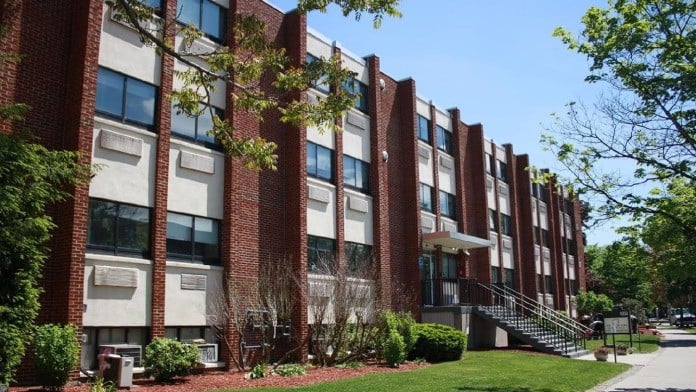
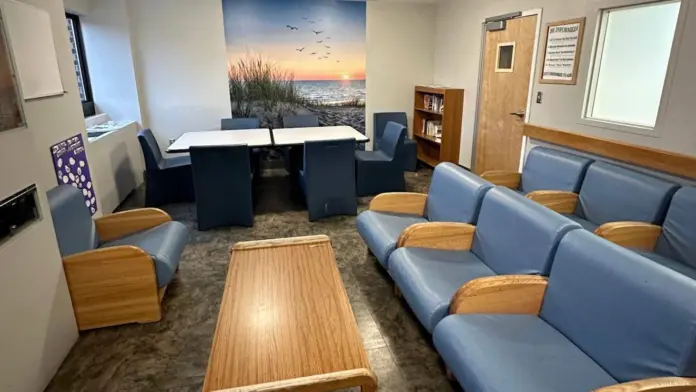
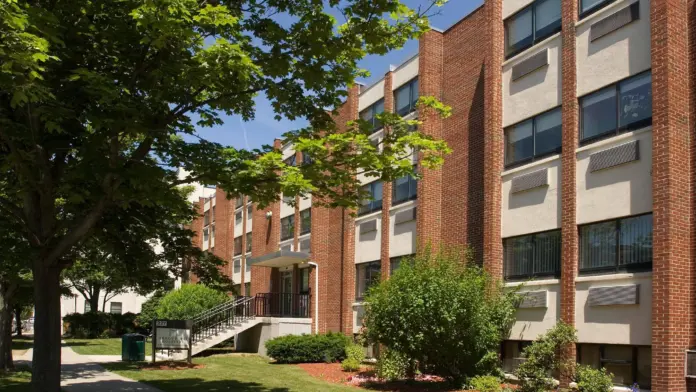
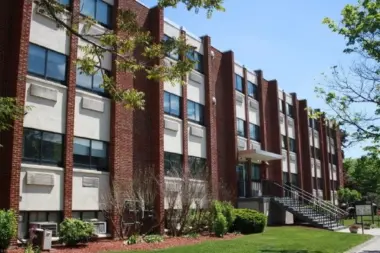
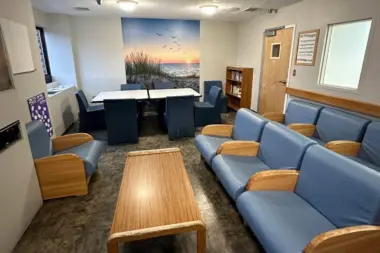
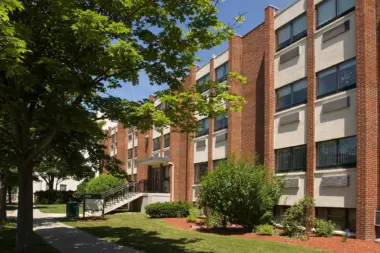
Accepted Insurance
Other Forms of Payment
Medicaid is a state based program that helps lower-income individuals and families pay for healthcare. Medicaid covers addiction treatment so those enrolled can use their coverage to pay for rehab. When a program accepts Medicaid the client often pays very little or nothing out of their own pocket.
Private insurance refers to any kind of healthcare coverage that isn't from the state or federal government. This includes individual and family plans offered by an employer or purchased from the Insurance Marketplace. Every plan will have different requirements and out of pocket costs so be sure to get the full details before you start treatment.
Self-pay involves paying for treatment out of your own pocket. You can use savings or credit, get a personal loan, or receive help from family and friends to fund your treatment. If you don't have insurance or your insurance plan doesn't cover a specific program, self-pay can help ensure you still get the care you need.
Financial aid can take many forms. Centers may have grants or scholarships available to clients who meet eligibility requirements. Programs that receive SAMHSA grants may have financial aid available for those who need treatment as well. Grants and scholarships can help you pai for treatment without having to repay.
Medicare is a federal program that provides health insurance for those 65 and older. It also serves people under 65 with chronic and disabling health challenges. To use Medicare for addiction treatment you need to find a program that accepts Medicare and is in network with your plan. Out of pocket costs and preauthorization requirements vary, so always check with your provider.
Sliding scale payments are based on a client's income and family size. The goal is to make treatment affordable to everyone. By taking these factors into account, addiction recovery care providers help ensure that your treatment does not become a financial burden to you or your family, eliminating one barrier to care.
Military members, veterans, and eligible dependents have access to specific insurance programs that help them get the care they need. TRICARE and VA insurance can help you access low cost or no cost addiction and mental health treatment. Programs that accept military insurance often have targeted treatment focused on the unique challenges military members, veterans, and their families face.
Addiction Treatments
Levels of Care
Partial hospitalization programs (PHP) are offered for patients as part of the treatment continuum. These programs offer a safe, structured environment while enabling the patient to return home at night and maintain important family and community relationships. Partial hospitalization may be appropriate for patients making the transition from inpatient to outpatient treatment or as a program alternative for patients who do not present any danger to themselves or others but need a structured treatment plan and environment.
The adult inpatient psychiatric services provide short-term admission for intensive diagnostic evaluation and treatment to stabilize individuals in crisis. While hospitalized, patients will work with a multi-disciplinary team headed by a psychiatrist who will design and implement an individualized treatment plan, including 24-hour nursing care, psychopharmacological interventions and a full range of psychosocial interventions.
At certain points in the recovery process, it's important to have support available 24/7. 24-hour clinical care offers a safe environment in which to recover from drug or alcohol addiction in peace, knowing medical detox and other treatment will happen with professionals on hand.
As part of the continuum of care at Arbour Health System, Intensive Outpatient Programs (IOP) are offered for adult patients whose psychiatric and/or substance dependence symptoms are impeding their ability to function interpersonally and professionally, but do not require the intensity of partial hospitalization level of care. The Structured Intensive Outpatient Addictions Programs (SA IOP/SOAP) aim to give participants a heightened level of self-awareness about their addiction, solid relapse prevention skills and a variety of coping skills to help them become more independent, self-caring and functioning adults in recovery.
Intervention services helps family or friends of addicts stage an intervention, which is a meeting in which loved ones share their concerns and attempt to get an addict into treatment. Professional intervention specialists can help loved ones organize, gather, and communicate with an addict. They can guide intervention participants in describing the damage the addict's behavior is causing and that outside help is necessary to address the addiction. The ideal outcome of an intervention is for the addict to go to rehab and get the help they need.
Programs are designed to provide evaluation and stabilization of the individual’s primary symptoms and problems. Treatment services emphasize development of coping mechanisms and skill-building to create the best opportunity to prevent relapse and allow stability.
Medically supervised detox is the process of removing addictive substances from your body and managing the withdrawal symptoms in a medically supervised environment. Typically, this is the first step in the recovery process and lasts an average of 5-7 days, though the length can vary depending on your individual needs. Once your system is cleared of alcohol and drugs, you'll likely transition to an inpatient treatment program for the next phase of your recovery.
Treatments
The goal of treatment for alcoholism is abstinence. Those with poor social support, poor motivation, or psychiatric disorders tend to relapse within a few years of treatment. For these people, success is measured by longer periods of abstinence, reduced use of alcohol, better health, and improved social functioning. Recovery and Maintenance are usually based on 12 step programs and AA meetings.
Addiction is a highly complex problem, and drug rehab in Massachusetts is often necessary to address it. These programs treat physical, mental, and relational issues that are involved. Treatment empowers individuals to manage these issues without the use of drugs.
Dual Diagnosis services offer a managed continuum of care designed to provide a comprehensive system of treatment and recovery from co-occurring psychiatric and substance disorders. Co-occurring psychiatric and substance disorders are treated simultaneously with a clear recognition that stabilization/arresting of the addiction is the most immediate concern upon the patient’s entering treatment.
A combined mental health and substance abuse rehab has the staff and resources available to handle individuals with both mental health and substance abuse issues. It can be challenging to determine where a specific symptom stems from (a mental health issue or an issue related to substance abuse), so mental health and substance abuse professionals are helpful in detangling symptoms and keeping treatment on track.
Opioid rehabs specialize in supporting those recovering from opioid addiction. They treat those suffering from addiction to illegal opioids like heroin, as well as prescription drugs like oxycodone. These centers typically combine both physical as well as mental and emotional support to help stop addiction. Physical support often includes medical detox and subsequent medical support (including medication), and mental support includes in-depth therapy to address the underlying causes of addiction.
Programs
Adult rehab programs include therapies tailored to each client's specific needs, goals, and recovery progress. They are tailored to the specific challenges adult clients may face, including family and work pressures and commitments. From inpatient and residential treatment to various levels of outpatient services, there are many options available. Some facilities also help adults work through co-occurring conditions, like anxiety, that can accompany addiction.
The Triangle Program provides quality mental health treatment that is sensitive to the needs of gay, lesbian, bisexual, transgender and questioning individuals who may have concerns with various life stressors or emotional functioning. Some of these issues may include trauma, depression, anxiety, isolation, gender or sexual identity, body image, living with HIV/AIDS, co-occurring mental health and addictions including sexual compulsivity.
Young adulthood can be an exciting, yet difficult, time of transition. Individuals in their late teens to mid-20s face unique stressors related to school, jobs, families, and social circles, which can lead to a rise in substance use. Rehab centers with dedicated young adult programs will include activities and amenities that cater to this age group, with an emphasis on specialized counseling, peer socialization, and ongoing aftercare.
Clinical Services
Cognitive Behavioral Therapy (CBT) is a therapy modality that focuses on the relationship between one's thoughts, feelings, and behaviors. It is used to establish and allow for healthy responses to thoughts and feelings (instead of unhealthy responses, like using drugs or alcohol). CBT has been proven effective for recovering addicts of all kinds, and is used to strengthen a patient's own self-awareness and ability to self-regulate. CBT allows individuals to monitor their own emotional state, become more adept at communicating with others, and manage stress without needing to engage in substance abuse.
Whether a marriage or other committed relationship, an intimate partnership is one of the most important aspects of a person's life. Drug and alcohol addiction affects both members of a couple in deep and meaningful ways, as does rehab and recovery. Couples therapy and other couples-focused treatment programs are significant parts of exploring triggers of addiction, as well as learning how to build healthy patterns to support ongoing sobriety.
Creativity is inherently healing, and can help those in recovery express thoughts or feelings they might not otherwise be able to. Creative arts therapy can include music, poetry/writing, painting, sculpting, dance, theater, sandplay, and more. Unlike traditional art, the final product matters far less than the experience of creation and expression itself.
Dialectical Behavior Therapy (DBT) is a modified form of Cognitive Behavioral Therapy (CBT), a treatment designed to help people understand and ultimately affect the relationship between their thoughts, feelings, and behaviors. DBT is often used for individuals who struggle with self-harm behaviors, such as self-mutilation (cutting) and suicidal thoughts, urges, or attempts. It has been proven clinically effective for those who struggle with out-of-control emotions and mental health illnesses like Borderline Personality Disorder.
Experiential therapy is a form of therapy in which clients are encouraged to surface and work through subconscious issues by engaging in real-time experiences. Experiential therapy departs from traditional talk therapy by involving the body, and having clients engage in activities, movements, and physical and emotional expression. This can involve role-play or using props (which can include other people). Experiential therapy can help people process trauma, memories, and emotion quickly, deeply, and in a lasting fashion, leading to substantial and impactful healing.
Research clearly demonstrates that recovery is far more successful and sustainable when loved ones like family members participate in rehab and substance abuse treatment. Genetic factors may be at play when it comes to drug and alcohol addiction, as well as mental health issues. Family dynamics often play a critical role in addiction triggers, and if properly educated, family members can be a strong source of support when it comes to rehabilitation.
Group therapy is any therapeutic work that happens in a group (not one-on-one). There are a number of different group therapy modalities, including support groups, experiential therapy, psycho-education, and more. Group therapy involves treatment as well as processing interaction between group members.
In individual therapy, a patient meets one-on-one with a trained psychologist or counselor. Therapy is a pivotal part of effective substance abuse treatment, as it often covers root causes of addiction, including challenges faced by the patient in their social, family, and work/school life.
Life skills trainings involve all the skills a person must have in order to function successfully in the world. These include time management, career guidance, money management, and effective communication. Truly successful addiction recovery is based on the ability to not only live substance-free, but to thrive. Life skills teaches the practical necessities of functioning in society, which sets clients up for success in life, and therefore sobriety.
Nutrition therapy, aka medical nutrition therapy (MNT), is a way of treating physical, emotional, and medical conditions through diet. Specific dietary plans are designed by professional nutritionists or registered dietitians, and patients follow them in order to positively affect their physical and mental health.
The purpose of this group is to create a safe space for participants to share feelings associated with their individual trauma experiences within a supportive structure. This group is also designed to enhance participants’ understanding of the recovery process while building on existing strengths and developing additional skills for maintaining change.
Amenities
-
Residential Setting
-
Private Rooms
Staff & Accreditations
Staff
Kurt Gunther
CEO
Krishnaswamy Gajaraj, MD, DPM
Medical Director
Cheryl Grau, LICSW
Clinical Services Executive
Accreditations

The Joint Commission, formerly known as JCAHO, is a nonprofit organization that accredits rehab organizations and programs. Founded in 1951, the Joint Commision's mission is to improve the quality of patient care and demonstrating the quality of patient care.
Joint Commission Accreditation: Yes
Contact Information
227 Babcock Street
Brookline, MA 02446




